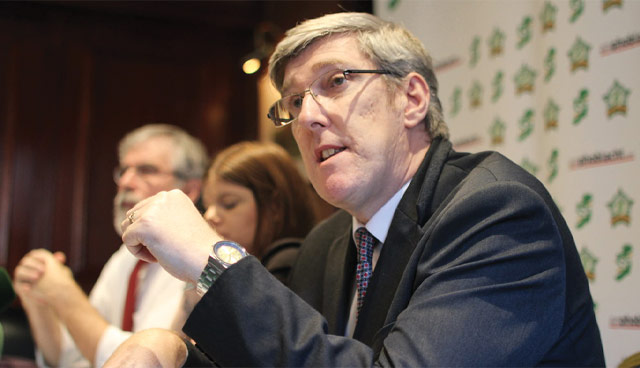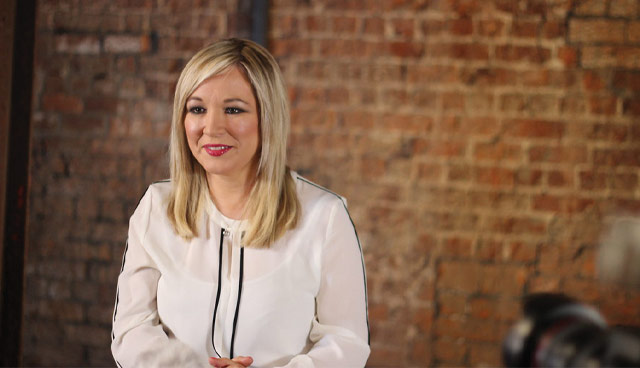O’Dowd launches vice-presidential bid

Former acting deputy First Minister John O’Dowd MLA’s announcement that he will challenge the incumbent Sinn Féin Vice President, Michelle O’Neill MLA, means that this year’s party Ard Fheis will see something not seen in the party’s modern era: an outright contest for one of the two positions atop the party hierarchy.
Since Gerry Adams was elected as President of Sinn Féin and began the process of taking the party down the path of a political programme that would make them the largest in Irish republicanism, Sinn Féin has been remarkable for its lack of publicised inner strife, with no open leadership contests having been held in the time since.
When Adams’s original deputy Phil Flynn stepped down, John Joe McGirl was appointed Vice President. His successor was the eventual MLA and MP for West Tyrone, Pat Doherty, who served as party Vice President for 21 years unchallenged, from 1988 until a party reshuffle saw him step down in 2009. Doherty was replaced by the then-MEP and rising party star Mary Lou McDonald, who was nominated to the position unopposed.
When Adams announced his retirement as Sinn Féin President, McDonald again moved up unopposed, being confirmed as the party leader at the 2018 Ard Fheis. Her ascension left the Vice President role vacant and it was filled, also unopposed, by O’Neill, an MLA for Mid Ulster since 2007 and former Minister of Health and Minister for Agriculture and Rural Development.
O’Dowd himself is no stranger to leadership roles within Sinn Féin, having served as acting deputy First Minister in the Assembly while O’Neill’s predecessor as Sinn Féin leader in the north Martin McGuinness campaigned to become President of Ireland. An MLA for the Upper Bann constituency since 2003, O’Dowd trained as a chef before entering politics and has served as Chair of Upper Bann Sinn Féin and as a member of the party’s Six County Executive. He was also the leader of the Sinn Féin group in the Assembly between 2007 and 2011, while also serving as Chair of the Public Accounts Committee before joining the Education Committee in 2008. Most notably, O’Dowd was Minister for Education from 2011 until 2016, a period of severe budget cuts for the sector following the economic crash in the last quarter of the previous decade.
O’Neill, who was out of the country on holiday when the news of the challenge was first broken and then confirmed by O’Dowd, tweeted that she welcomed “debate and choice within the party” and confirmed that she would be seeking re-election as Vice President at the Ard Fheis. It is believed that O’Dowd had discussed the challenge with his local cumann and that party headquarters had been informed of the challenge before the news was broken to the public. O’Dowd tweeted to confirm the news, saying that he looked forward to the debate “across the party and island”.
Sinn Féin northern Chair, Chris Hazzard MP has so far refused to be drawn on who he would be supporting in the race, but stressed the “democratic” nature of the party’s voting process. As of yet, it is unclear how Sinn Féin will conduct the election, whether through a system of cumann delegates or one member one vote, due to the irregularity of the occurrence within the party. Very little has been said publicly by party figures since the announcement of O’Dowd’s challenge, but Fermanagh and South Tyrone MP Michelle Gildernew has announced that she will support O’Dowd’s bid.
Gildernew said that O’Dowd’s challenge was “a healthy thing” and that O’Dowd possesses “the skill-set that potentially we [Sinn Féin] need”. She added that the challenge was important as it showed the party’s grassroots supporters that its leadership were not taking it “for granted”.

The McDonald-O’Neill leadership ticket has so far delivered political inertia at best for Sinn Féin, with the Executive dormant, the party retaining the same number of seats in this year’s local government elections without making a gain, a disastrous campaign for Irish Presidency by then-MEP Liadh Ní Riada, the loss of Ní Riada and Lynn Boylan in this year’s European elections in the Republic of Ireland, and the party’s inconsistent polling in the Republic despite Fianna Fáil keeping in power a Fine Gael government that has overseen record homelessness numbers and rent prices.
Gildernew acknowledged as much when signalling her support for O’Dowd: “There have been some disappointments across the island from electoral terms. We don’t want our party membership to think we are taking them for granted. This has given them an opportunity to have a debate in the leadership of the party and that can only be a healthy thing.
“I think John has the skill-set that potentially we need coming into this next phase of the struggle for Irish freedom and bringing about an Ireland of equals. That is no disrespect at all to Michelle who I have worked with really well and have an awful lot of time for. I just think John has potential. I think the fact we are having this competition is healthy.”
However, veteran Sinn Féin figure and O’Neill’s former fellow Mid Ulster MLA Francie Molloy has said that he was “disappointed” by O’Dowd’s decision to challenge for the Vice President position and “surprised” by Gildernew’s decision to back him. “I’m disappointed that people have put in a challenge at this particular time, before the new leadership has had the opportunity to develop and come at the process and to start delivering,” he said.
“In Sinn Féin, leadership comes from the Ard Comhairle, and both Michelle and John O’Dowd are on the Ard Comhairle, that’s where the decisions are made. The President and the Vice President both take their directions from the Ard Comhairle, so the leadership has to come from the base, and the membership.”
O’Neill herself was more welcoming of the challenge, saying: “John is my comrade. John is perfectly entitled to challenge, perfectly entitled to put his name forward. It is not an issue of being hurt or offended or any of that, this is politics. Our membership will decide the future of leadership of this party and that is where it sits.”
Regardless of the challenge’s outcome, this is a Rubicon moment for modern day Sinn Féin as its processes become more transparent and possible divisions within the party start to appear. Whether O’Dowd or O’Neill emerges victorious, the airing of grievances and concerns that typically comes with such a contest may be exactly the type of cleansing ritual the party needs after its electoral disappointments of late.





